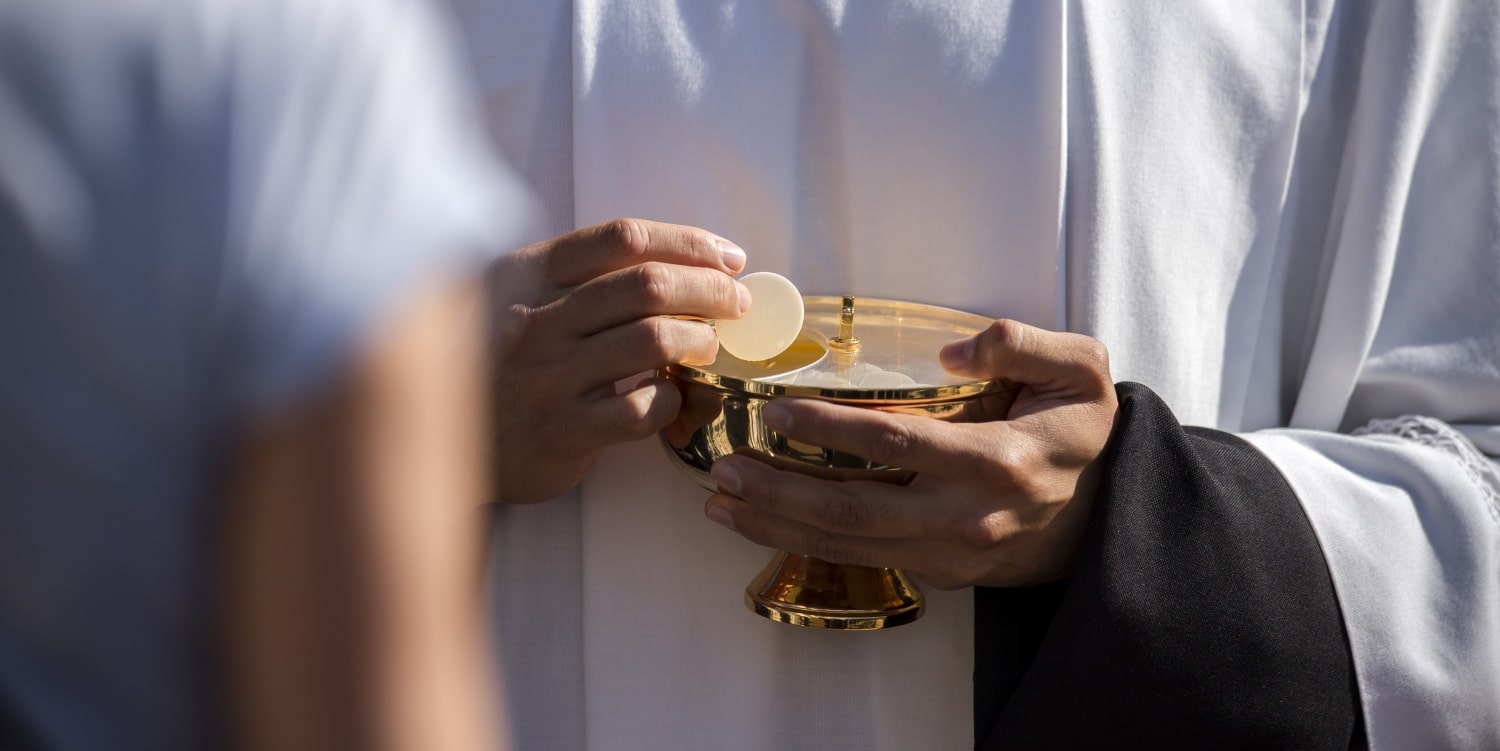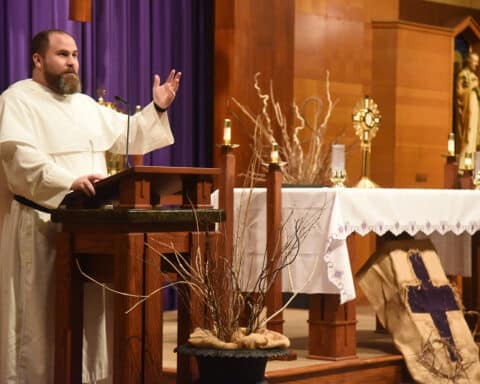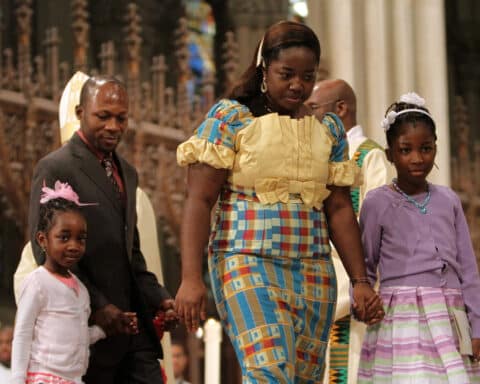Dear Friend,
The most addictive app on my phone is not tied to social media or news or sports or games. The most addictive app on my phone is Amazon. That app has formed my habits more than any other. It allows me to move from the impulse to purchase in under 10 seconds. A thought occurs to me, a “need” presents itself to me, convenience nudges at me, and the Amazon app lets me react immediately and then do nothing else. I want, I click, I magically receive.
I am not addicted to any one of the objects I find on Amazon; instead, it’s the ease that I’m hooked on. It’s all so easy. It takes away friction in my life. I don’t have to long or wait or hope — I just click and I’m satisfied. This is the promise of technology: to make everything easy everywhere.
To be Eucharistic, you and I must resist the allure of ease. Christ has no interest in making us into mere consumers; he means instead for us to become capable of loving him. Love knows nothing of ease.
In my previous two letters, I talked with you about “How to date” and “How to have sex.” In both letters, I stressed the importance of attentiveness and follow-through. The beauty of dating and, to a greater degree, the conjugal union is tied up with how we must grow in virtue, becoming more responsible and more real.
Read more from our Letters to A Young Catholic series here.
The same holds true with becoming Eucharistic: This is the path of becoming more yourself, more alive, more engaged, more responsible. The difference here, of course, is that the Eucharistic encounter is, first of all, the encounter with the Lord himself. He is the source and summit of everything, and this encounter is the most foundational of all. Even still, I will continue to speak of the importance of attentiveness and follow-through — or as I call it here: preparation and translation.
That is how we become Eucharistic: we prepare and we translate. In this letter, I will talk about preparation, and in the next one, I will talk about translation.
Preparing a dwelling place
We probably all know at least a little bit about the Book of Exodus. The Israelites are enslaved in Egypt, the Lord calls Moses, the Israelites are driven out of Egypt, and then they are definitively separated from their enslavers when they pass through the Red Sea. We might be surprised to learn that these events don’t even bring us halfway through the book — the crossing of the Red Sea happens in Chapter 14, but Exodus has 40 chapters. Most of the narrative occurs after the Israelites are freed from Egypt.
Now, you may easily guess that in the remaining 26 chapters, there is something about the Ten Commandments and a golden calf. But even those are part of a larger issue: the issue of freedom. Yes, the Israelites were freed from slavery in Egypt, but that begs the question: What were they freed for?
Back when Israel was in Egypt, the Lord God already proclaimed what he was freeing his people for: “I will … deliver you … and I will take you as my own people, and I will be your God” (Ex 6:6-7; and cf. 19:4-6). The ultimate reason for the Israelites’ freedom is so that they might become God’s chosen people. But God will not take them by force. He will not enslave them. To become God’s chosen ones, they must freely accept the Lord as their God.
The Israelites must choose the Lord as their God by welcoming him into their midst. This is meant quite seriously and unambiguously: The Israelites are to construct a dwelling place — or tabernacle — so that the Lord God may come and be with them. Therefore, the Lord says to Moses: “Speak to the Israelites: Let them receive contributions for me. From each you shall receive the contribution that their hearts prompt them to give me. … They are to make a sanctuary for me, that I may dwell in their midst” (Ex 25:2, 8).
Notice what the Lord says to Moses: the materials for this sanctuary can only come from those whose hearts make them willing. God wants to come to them, but they must be willing to receive and welcome him. And to do that, they have to prepare a place for him, from their hearts.
When the Israelites create a golden calf to worship, they have taken the materials God asked them to use to create a place for him, and they have made something else that they want to worship instead of the Lord who saved them. They chose ease in getting what they wanted right away, rather than preparing and waiting for the Lord.
Even still, God’s desire to dwell among the people persists and the invitation to prepare to receive him remains. That is in fact what occurs in the final chapters of Exodus: The people make offerings to the Lord from their generous hearts, the people labor strenuously and skillfully to construct a dwelling place for God, and the Lord comes to dwell in the midst of the people.
The coming of Jesus Christ
What began in Exodus is completed in Jesus Christ: God comes to dwell with his people. But what was true in Exodus is also true of Christ: we must prepare to receive him. He will not take us by force, he will not enslave us, and so we must choose to receive the Lord as our God by welcoming him.
This is why being Eucharistic requires preparation. To accept the Lord as our God means that we must open our hearts to him. He seeks us, but we must be willing to receive him.
Preparation was not easy for the Israelites in Exodus, and it is not easy for us. It is not a matter of click and done, as it is with my Amazon app. Rather, it is a matter of careful craftsmanship, generous giving and patient waiting.
So how do we prepare for the Lord in the Eucharist? Maybe there’s no better starting point than to follow the prayer of St. Thérèse of Lisieux, who prayed and prepared regularly to receive the Eucharist in this way: “When I am preparing for Holy Communion, I picture my soul as a piece of land and I beg the Blessed Virgin to remove from it any rubbish that would prevent it from being free; then I ask her to set up a huge tent worthy of heaven, adorning it with her own jewelry; finally, I invite all the angels and saints to come and conduct a magnificent concert there. It seems to me that when Jesus descends into my heart He is content to find Himself so well received and I, too, am content” (“Story of a Soul,” Chapter 8).
Thérèse prepares as diligently as the Israelites did in the desert. As they prepared land to construct God’s dwelling place, so she considers her soul that very land and desires to remove the rubbish — the sins — from her soul through confession. As the Israelites constructed a dwelling place with their treasures, so Thérèse begs Mary to bring her the grace to construct a dwelling place for the Lord in her own soul, just as Mary made her own body and soul into God’s dwelling place. And just as all the Israelites’ artists and artisans beautified the Lord’s dwelling place, so Thérèse asks those great artists of the faith — the saints, along with the angels — to help her soul to shine and sing for the Lord.
This might sound rather pious, even overly sweet. But think again about what Thérèse is saying and doing. She is taking the time, putting in the effort, and beginning to ask for help to prepare a place fit for the Lord God to come dwell. That “place” is her own body and soul. That is where Jesus Christ wants to dwell: in her, and likewise in us.
Receiving holy Communion is nothing like grabbing something off the shelf in a store or clicking “buy now” through an app. Instead, it is a heart-to-heart encounter. With his whole heart, Our Lord and our God seeks to dwell with us, and with our whole heart, we welcome him.
Becoming Eucharistic is not merely about receiving the Eucharist. It is also about preparing to receive our Eucharistic Lord. Taking the time to pray before receiving him matters. Going to confession to clear out the “rubbish” matters. Asking Mary to show us the grace to receive her Son, perhaps through praying the Rosary, matters. And asking for the intercession and guidance of the angels and the saints to love Christ and they love him — that matters, too.
Amazon has hooked me on ease, but the Lord wants me to prepare to meet him with my whole self. You and I slowly become Eucharistic by preparing well to receive the Eucharist.
Sincerely,
Leonard J. DeLorenzo, Ph.D., works in the McGrath Institute for Church Life and teaches theology at the University of Notre Dame. Subscribe to his weekly newsletter, “Life, Sweetness, Hope,” at bit.ly/lifesweetnesshope.






